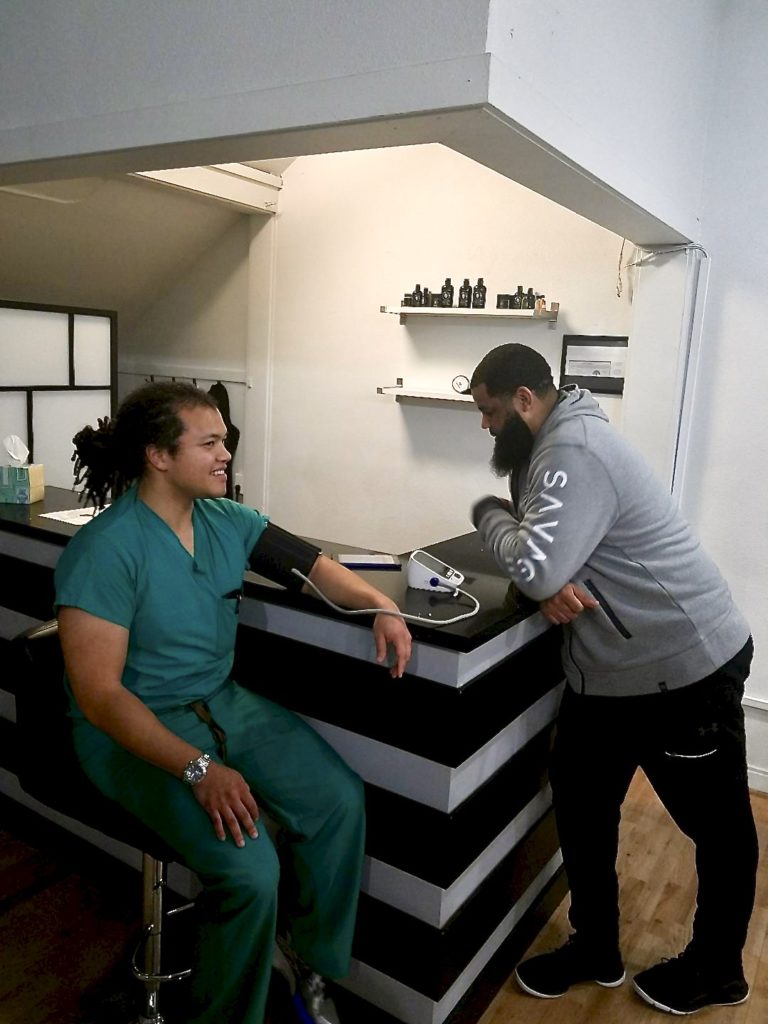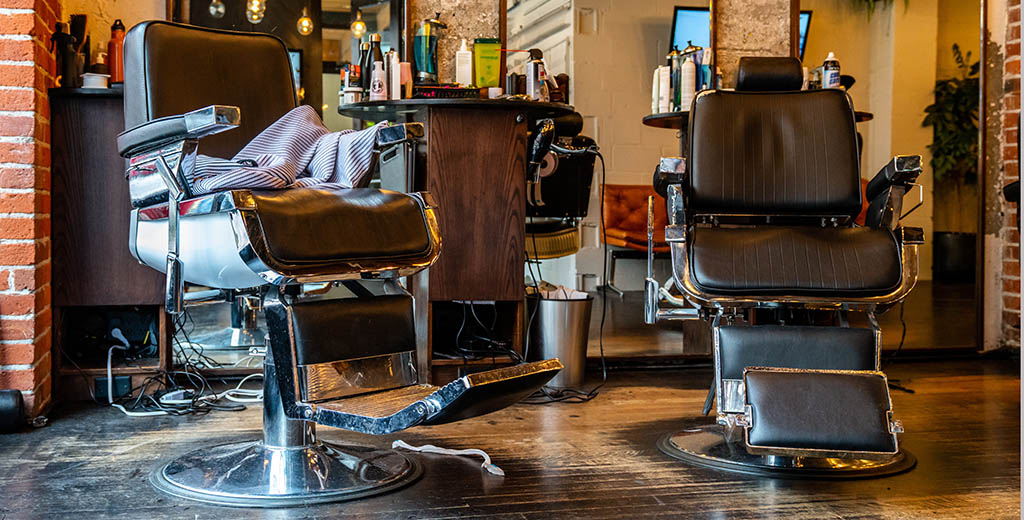Yusef Wright, who owns and runs a barbershop in downtown Oakland, does a lot more than just cut basketball star Stephen Curry's hair. Wright is a leader, a voice for the local Black community, an entrepreneur, an activist, a family man and, for the past four years now, a health coach for many of his clients.
"There is a lot of talk about trust in a barbershop," said Wright, who grew up in East Oakland and cuts and styles hair at his shop, Benny Adem Grooming Parlor, on 14th Street. "Outside of the church, it's one of the most trusted places for Black men, period. Like the teacher who taught me how to barber told me, 'Once a man feels comfortable enough to trust you with a blade to his throat that trust can never be disrespected.'"
As a health coach, Wright is certified to take his client's blood pressure. And now, he also chats with them about COVID-19. His connection with Stanford Medicine's Kenji Taylor, MD, an instructor of medicine and community activist, helped him become trained as a health coach and a part-time outreach coordinator to help spearhead a coronavirus education program with four barbershops in Oakland.
"The barbershop provides an environment that organically brings up these conversations," Wright said. "I'm like a point guard and a coach. I'm a messenger to others."
Bridging the health care gap for Black men
Wright was trained as a health coach through the Cut Hypertension Program, an organization that Taylor founded 10 years ago, when he was a medical student at the University of Pennsylvania. The program, which now works with barbershops in Philadelphia, Atlanta and the San Francisco Bay Area, trains Black barbers to measure blood pressure and talk to their primarily Black male clients about heart disease and other health problems.
During the pandemic, the training has been expanded to include sharing such information as how to stay safe from the coronavirus virus -- the use of masks, social distancing, and when and where to get a test.
Since Taylor first set up shop at Philly Cuts in Philadelphia, the public health concept of bringing medicine to Black men through their barbers has grown in popularity. Black barbers have become mental health advocates, held screenings for diabetes in their shops and given advice on HIV, prostate cancer, nutrition and other important health issues.

Black men tend to have less frequent contact with physicians and other health care providers than white men, according to the Centers for Disease Control and Prevention. They also have disproportionately high rates of heart disease and other chronic illnesses. As Wright explained, Black men simply don't trust doctors nearly as much as they trust their barbers.
These barbers create a bridge between health care professionals and Black men, Taylor said.
"What these barbers do, first and foremost, is welcome us [the Cut Hypertension program] into their space. They encourage their clients to get their blood pressure taken, they coach people in the ABC's of cardiovascular health," he said, noting that they are also opening up new possibilities to help prevent the spread of the coronavirus.
Barbershops as community hubs
Taylor remembers visiting barbershops in Pennsylvania with his dad when he was a kid. Their local barbershops were places of community and socializing, where Black men felt comfortable bringing their sons. There was music and sports on the radio or TV. A handful of barbers chatted among themselves, or with their clients, and sometimes with the entire room. People lounged around waiting for their cuts, reading magazines -- sometimes just stopping by to hang out.
"My dad was African American and he grew up in the South," said Taylor, who grew up in rural Pennsylvania on government assistance programs, raised primarily by his single mom, an immigrant from Japan. "My dad was mostly out of the picture. But I heard stories all the time from my dad, uncles and aunts who grew up in segregated schools in the South, where white kids spit on them from the bus window as they walked down the road to their separate school. The rule was self-sufficiency, and you didn't trust anybody out of your immediate community."
Barbershops were among the few independent businesses that Black people could own back when African Americans were freed from slavery, Taylor said. Today, these barbers remain trusted leaders in their communities. Turning to them to help share information about the coronavirus -- which multiple studies show has disproportionately affected minority and ethnic groups -- just makes sense, he said.
"In December, we incorporated COVID-19 into our virtual training -- what it is, how it's affecting the Black community, safety measures," Taylor said. "We are working on vaccine education now."
Surviving the pandemic
Because of pandemic restrictions, Wright closed up shop for more than six months, but he's open now under limited capacity and has incorporated the necessary added coronavirus safety measures -- masks at all times, social distancing, sanitation and disinfection standards. Even with the changed atmosphere and a smaller staff, his role as a coronavirus outreach coordinator means he is well positioned to help his community survive this public health crisis.
"I'm blessed that my shop is still in existence, but it's been a hardship," Wright told me. "I want to make sure our clients are aware of COVID so that we can operate in the safest way possible, exemplifying the motto of my shop which is 'self-improvement through self-awareness.'"
"We really appreciate the relationships with our clients, that they continue to trust us, not only with their hair but with their health," Wright said.
Top image by Daniel Avram; Center courtesy of Kenji Taylor




